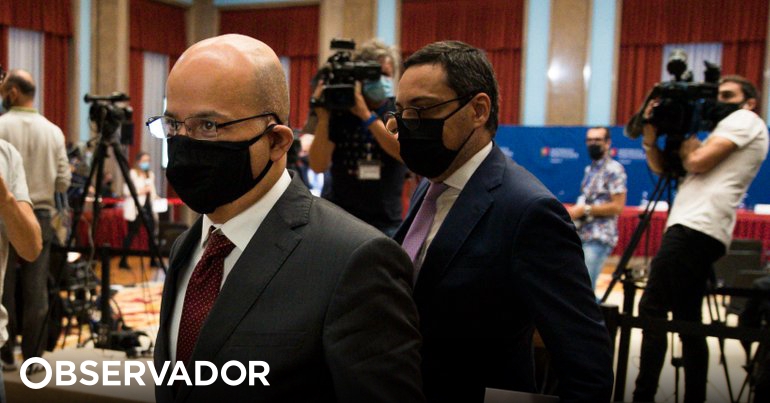Thanks for being our subscriber. Don’t forget to subscribe to our site Exclusive behind-the-scenes newsletter.
The Minister of Finance announced an unusual large fuel consumption subsidy package for families, which will allow a 10 cent deduction for consumption of up to 50 liters per month. In Brussels, where he attended the European Council, the Prime Minister stressed that the measures taken in this “exceptional and temporary situation” are “of an absolutely exceptional and transitory nature”.
The return will be made by transfer to the bank account via the platform generated by the IVAucher system and will be practically equivalent to the value of five euros per month for each taxpayer, which represents 25 euros. The measure will go ahead in November and will be in effect until March 31 and will have an impact of 130 million euros, Joao Liao revealed on Friday before the start of the hearing that marked the beginning of the debate on the proposed 2022 state budget in parliament. .
The government will also suspend a planned increase in the carbon tax on fuel until March 2022 which could raise prices by up to five cents per liter from 2022 that will benefit all users, businesses and families. This action would represent a loss of revenue in the order of 95 million euros.
Antonio Costa has stated in Parliament that the carbon tax will increase in 2022, but the government is now (temporarily) reversing it, rolling out this update for the second quarter of next year. The annual review of the carbon tax is enshrined in the law adopted by the PSD/CDS government in 2014, which states that its update is in line with the evolution of carbon dioxide quotations. Suspension of this update does not require permission from the European Commission, the Executive believes, but it will be necessary to issue a decree to clarify this suspension because there are doubts whether the update under the conditions provided for in the law is automatic or not.
The Finance Minister stresses that this is a large and unusual package to respond to the situation of high prices, which he also describes as unusual. Joao Liao also highlights that Portugal is the first country in the European Union to cut oil tax in an exceptional way in response to higher fuel prices.
The measures announced last week to contain the impact of the fuel represent a revenue loss of around 300 million euros, according to figures already disclosed by the Finance Ministry. This is a higher value than that which would result from the IRS levels review scheduled for 2022. This budget impact will be split between this year and next. However, the bulk of the announced measures for families and public transportation is temporary, as the expected measures for freight carriers will have a lasting impact.
Compensation for transport companies and taxis will be paid through the Environment Fund and has an estimated cost of €25 million.
The measure now announced does not translate into a tax cut, but rather into direct financing for families to purchase fuel up to 50 liters per month, which is equivalent to a deposit for an SUV. The return will be made through the IVAucher program, which means that the payment is made by card as on a VAT return.
However, there will be no need to accrue VAT. Before you can take advantage of this discount and just Register with your tax number On the existing IVAucher website which will be adapted to take advantage of the refund to the account. There are currently over 700,000 members.
The government is also preparing exceptional measures to support the passenger transport sector, with transfers to companies, by creating a compensation mechanism for bus and taxi companies, which consists of a one-time non-reimbursable subsidy in the next five months from the increase in the cost of fuel.
Taxis and buses receive €190 and €1050 due to higher fuel prices
In the case of freight transport, the exemption from payment of Individual Circulation Tax (IUC) and fuel which may be covered by Professional Diesel Compensation will be maintained. Businesses can also continue to deduct fuel costs from the amount subject to tax under the IRC.
Antonio Costa had already indicated this week that the government would announce new measures to counter the increase in fuel prices. The mechanism implemented last week included the return of the value-added tax that was charged more in exchange for the increase in fuel prices this year, by reducing the tax on petroleum products. On Saturday, the measure made it possible to reduce the tax on gasoline by two cents and on diesel by one cent. But the decrease caused by this tax cut was immediately countered on Monday by a new increase in the final price due to the higher prices of raw materials in the international market. Which created the perception that it would be an inadequate response.
In Brussels, after the European Council, the Prime Minister added that the meeting also addressed this issue and that Portugal supports the proposal made by Spain to the Commission to promote a study on the “opportunity and advantages of joint procurement” and another on the process of shaping fuel prices “to see if the option to set the price with marginal logic is not It is still valid, that is, for the higher price of those who sell, to encourage more efficient producers. This is because nowadays, in countries where the rate of incorporation of renewables is high, this incentive is starting to have a negative effect.”
Article updated at 5:20pm with statements from the Prime Minister in Brussels

“Wannabe internet buff. Future teen idol. Hardcore zombie guru. Gamer. Avid creator. Entrepreneur. Bacon ninja.”

